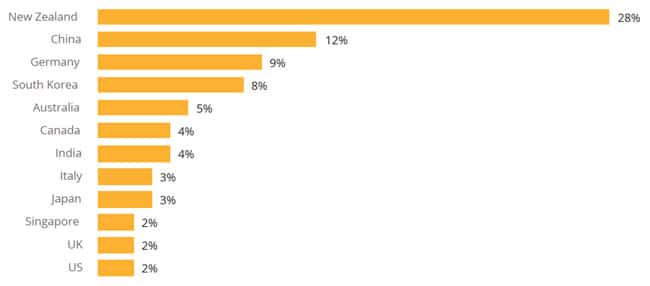Updated survey data tracks student intent through June
- The latest QS research on prospective international students’ study plans shows that global interest in study abroad in the relatively near term (2020 and 2021) remains high
- It also shows that students become more willing to consider an online start for their programme abroad when this mode of delivery is positioned as temporary – i.e., three to six months – before a switch to face-to-face classes would begin
- New Zealand is far and away the country with the best image regarding how it has handled the COVID-19 crisis
In uplifting news for educators who have been hard hit by the COVID-19 crisis this year, new QS survey data shows that many prospective international students are still determined to study overseas, whether that’s in 2020 as they had originally planned, or in 2021. The new data comes from QS’s ongoing survey of tens of thousands of international students in recent months – a survey effort that began in February 2020.
What is especially notable about the June data is that QS analysts drilled down more than in past surveys into students’ feelings about when they would ideally like to begin studying, which illuminates how intense the desire still is among many students for an opportunity to study abroad. QS also looked into whether students’ interest level in online learning changed depending on the amount of time they expected this mode of delivery to last before face-to-face classes could resume.
Most say that study plans have been affected
The latest survey data shows 59% of students now say that their study abroad plans have been impacted by the crisis, which is a fairly stable indicator compared with last month, when 57% said the same. The current proportion is up significantly from April, however, when only 46% of students said their study plan had been affected.
The trend is similar regarding students’ sense of what they will do in light of the coronavirus crisis: 55% intend to delay or defer their study plans until next year, stable since May (53%) but up significantly from April, when only 47% expected to delay or defer.
Most would jump at the chance to start in 2020
QS asked the students surveyed in June, “In an ideal world, what year would you like to start your studies?” We aren’t living in an ideal world, of course, but the question strikes at a crucial area of interest for educators, i.e., how much have students’ hopes to study abroad in the near future fallen away as we enter the seventh month of the pandemic? The answer is revealed in the proportion wanting to begin studying abroad either this year or next: 82%, split between 42% for 2020 and 40% for 2021. Only 11% said they would like to begin in 2022 and 8% would want to in 2023.
Further room for optimism can be found in the fact that when QS asked those who wanted to begin their studies in 2020 what year they actually expected their studies to begin, 62% said they expected to begin in 2020, a much larger proportion than the 35% who expected to begin in 2021. This finding reveals an inherent determination among students, who’ve spent a great deal of time looking forward to studying abroad, to follow through on their plans, in spite of the pandemic.
New Zealand response rated highly
QS notes as well that, “54% of respondents have reconsidered where they want to study overseas based on how different governments have handled the coronavirus crisis…For institutions, this highlights the importance of governmental response to the global crisis and ensuring that their nation is seen to be proactively and effectively addressing the pandemic.”
Not surprisingly, when students were asked which country had handled the coronavirus crisis the best, by far the greatest number chose New Zealand, followed at a distance by China, Germany, and South Korea. New Zealand is already a major destination for international students, and it will be interesting to see how much more competitive it becomes as a result of Prime Minister Jacinda Ardern’s admirable handling of the crisis – especially as it looks as though New Zealand, along with Australia and many European countries, will be the first to open borders again to international students. By contrast, two other leading destinations – the US and UK – are viewed in a poor light by students evaluating their performance during the pandemic; it remains to be seen how much this will play out in students’ choice of destination going forward.

Many would consider an online start
QS has been asking students about their interest in online study during its pandemic-related survey programme. In June, nearly half (47%) said they would be willing, with another 27% unsure. Those schools and universities that do a good job at (1) creating a strong online offering, and (2) communicating, as QS notes, “the benefits and strengths of their online offering” could move the needle even further for students who say they aren’t yet sure.
Another positive finding – revealed by new questions added to the research questionnaire – is that interest in beginning courses online rises to 75% of prospective students if the online component is guaranteed to last for no more than three months. Interest falls slightly when the time frame for online learning expands to six months (64%) but two-thirds is still a significant proportion of students who would be willing to begin online if they knew they could switch to face-to-face learning in the relatively near future.
While no one can predict with certainty the mode of programme delivery this year, QS notes that communicating intentions and efforts to switch to face-to-face learning will be key:
“Institutions should create and communicate their contingency plans to prospective international students, detailing how their online learning offering will be delivered, how they will transition to face-to-face teaching, and be as specific as they can be on the timelines they will follow to do so.
While uncertainty remains rife, institutions can detail the strategic planning they are conducting to ensure they are prepared for shifts in government guidance and reassure prospective students that they will act quickly and effectively.”
For additional background, please see:













